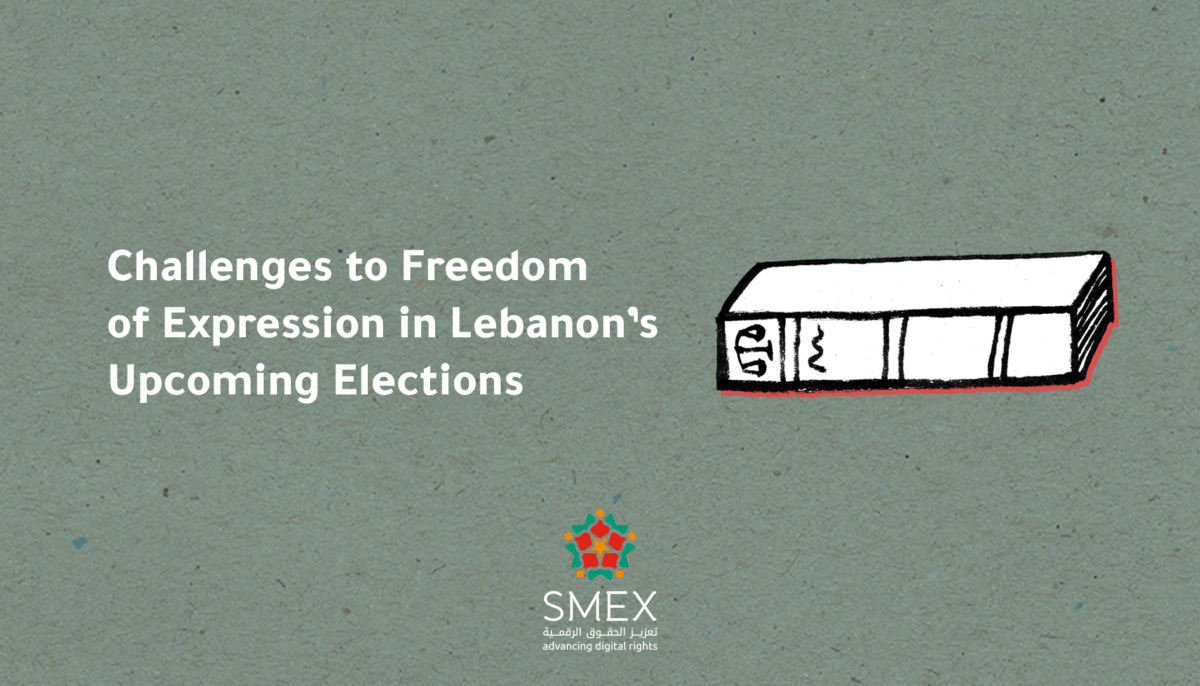Lebanon’s upcoming parliamentary elections, scheduled for May 15, 2022, will take place amid a total collapse of the economy and an utterly dysfunctional state. Over the past three years, the majority of the population has been grappling with a series of crises that stunted their everyday lives.
Daily civic unrest instilled further sectarian divisions following the mass protests of October 2019. In early 2020, the outbreak of Covid-19 severely compromised Lebanon’s underfunded health sector. In August of the same year, thousands lost their loved ones, homes, and businesses in Beirut’s Port explosion. Growing inflation and bank restrictions in the last two years have added further economic burdens on struggling families and individuals.
With waning hope in what the next phase might bring, many in Lebanon (and abroad) are betting on this year’s elections to signal some kind of change.
The Freedom of Opinion and Expression Coalition, in collaboration with independent civil society members, held a roundtable meeting in April to discuss the reality of freedom of expression in Lebanon before, during, and after the parliamentary elections. The discussion addressed the main contentious issues related to the elections, including campaigns, electoral spending, and the margin of freedom available online and offline. The participants also discussed topics such as the spread of fake news and misinformation, the role of tech companies, and the role of traditional and alternative media. Here are the main takeaways:
Electoral Media and Advertisement
There are numerous legal loopholes undermining freedom of expression, nullifying the role of oversight bodies, and rendering laws ineffective. Electoral spending and the Electoral Supervisory Commission are two of the main thorny issues. Law No. 44 of 2017 on the Election of Members of Parliament distinguishes between media coverage and paid advertisement and elaborates on the role of the various forms of digital media.
Electoral media and advertisement are monitored by the Electoral Supervisory Commission, but the latter is unable to effectively perform its duties, either because the law limits its power to media outlets, whereby it has no authority over candidates themselves, or due to logistical challenges associated with the economic crisis.
In fact, media outlets are selling airtime as a form of paid advertisement and are refusing to disclose the sums paid by candidates in return for media appearances (numbers range from $25,000 to a whopping $125,000). Given that the Electoral Supervisory Commission practices subsequent control (when one month passes after the elections), it cannot prevent candidates from overstepping the electoral spending limit, as was the case in the 2018 elections.
In an attempt to increase transparency and oversight of electoral spending, Meta included Lebanon on Facebook’s list of countries for the enforcement of ads about elections or politics as of March 22. Anyone running political or electoral ads in Lebanon must therefore undergo an authorization process by verifying their identity and must be located in Lebanon.
In terms of field oversight, Article 74 of the Law on Municipalities gives municipalities the right to regulate the placement of advertisements in public spaces and to limit violations. However, according to a survey conducted by the Lebanese Association for Democratic Elections (LADE), most municipalities are not aware that this falls within the scope of their powers. Other municipalities indicated that they do not have the logistical resources to undertake this task and that this issue must be addressed by the Electoral Supervisory Commission.
Protecting Voters’ Privacy
In the past few months, many people with Lebanese phone numbers received SMS messages promoting electoral campaigns, in a clear violation of the Law on Electronic Transactions and Personal Data (Article 32). This raises questions regarding the effectiveness of state oversight on marketing agencies that collect data and sell it to candidates, in a clear violation of the law.
Similar cases have been reported, whereby people receive unwanted messages through WhatsApp in many forms, such as adding the user to a group managed by an unknown number that sends electoral promotional messages before exiting the group.
Impact of the Economic Crisis on Equal Opportunities and Freedom of Expression
Due to the economic crisis, candidates are not competing on equal grounds, as the cost of candidature and campaigning has risen exponentially and has become out of reach for ordinary citizens. This is due to the fact that banks are preventing depositors from withdrawing their savings, not to mention that the Lebanese pound has lost nearly 90% of its purchasing power.
Meanwhile, the economic crisis has led to a rise in political clientelism in order to maintain popular support, as candidates are providing many services, such as paying school tuition fees and hospital bills, offering jobs, and other forms of assistance in return for votes.
Harassment on the Ground
Candidates in certain areas are unable to freely communicate with voters due to the harassment they face on the ground and the lack of media coverage for their activities. This includes threats, exclusion, and economic boycott against anyone that hosts electoral events for opposing political forces.
Logistic Challenges on Election Day
It is likely that there will be numerous logistic and legal challenges on election day. Logistically, the government has yet to secure uninterrupted electricity during election day. So far, the only solution being discussed involves municipalities paying absurd sums of money to private generator owners to ensure uninterrupted supply of electricity. However, this solution fails to consider the political affiliation of generator owners and the implication of their personal politics on how they will choose to offer their services on election day.
While many judges are refraining from taking part in supervising the elections, meager sums of money have been allocated to polling station head officers and clerks, which do not even cover their transportation and accommodation expenses. This could undermine the smooth running of the electoral process, as those in charge of guaranteeing the integrity of the elections will be more easily swayed through bribes or services, which threatens the legitimacy and integrity of the entire electoral process.
Freedom of Expression: Criminalization and Lack of Guarantees
Article 74 of the Electoral Law offers protection to candidates’ lists from defamation, libel, and slander. In fact, over the past few years, Penal Code provisions on defamation, libel, and slander have been increasingly used by powerful individuals to take legal action against opposition figures and journalists.
Moreover, the Law on the Protection of Whistleblowers does not include any practical mechanisms that guarantee such protection. The law requires whistleblowers to submit their reports to the Anti-Corruption Commission, without specifying how they will be protected after publishing their investigative or journalistic reports. All of these practices limit voters’ ability to access information.
Conclusion
Considering the power-grip of state-affiliated political parties over many areas in Lebanon, we expect a significant degree of corruption and intimidation in the voting polls, especially considering the high stakes of this year’s elections. We’re already witnessing the backlash against opposition candidates in places where traditional parties have always represented the majority of voters.
As new voices enter Lebanese politics, the dwindling oligarchs will pull every card to get their votes — including ostracizing new candidates and their supporters. The 2022 parliamentary elections will witness increased corruption and illegal influencing of voters, whether through direct bribery or by offering (imagined) services in health, education, and employment. Manipulation and harassment in the polling centers is also highly likely, as well as disproportionate advertising and endorsement in the media.
Members of the FoE Coalition in Lebanon will be closely tracking the electoral process as it unfolds over the next month. SMEX and other initiatives are monitoring numerous aspects of the elections to document and report any breaches and violations to freedom of expression as well as individuals’ freedom to vote without pressure or intimidation.



